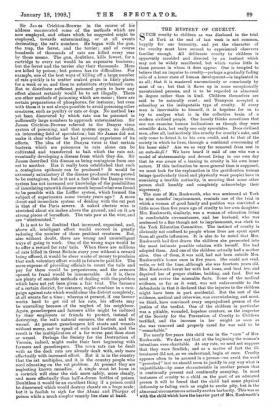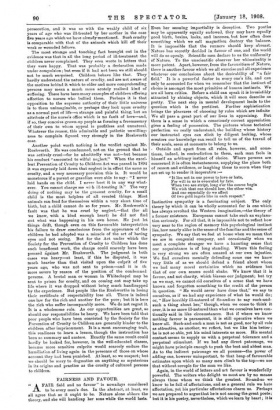THE MYSTERY OF CRUELTY.
SUCH cruelty to children as was disclosed in the trial at York at the end of last week is not common, happily for our humanity, and yet the character of the cruelty must have seemed to experienced observers familiar enough. All deliberate cruelty to children is apparently moulded and directed by an instinct which may not be widely manifested, but which varies little in those persons in whom it does appear. One is tempted to believe that an impulse to cruelty—perhaps a gradually fading relic of a lower state of human development—is implanted in us all; that it is mastered unconsciously or consciously by most of us ; but that it flares up in some exceptionally unrestrained persons, and is to be regarded as abnormal in degree rather than in kind. Children themselves are said to be naturally cruel ; and Tennyson accepted a schoolboy as the indisputable type of cruelty. If every man is inscrutable to himself, it is hopeless for us to try to analyse what is in the collective brain of a modern civilised people. One loosely thinks sometimes that one can examine human inclinations as though they were scientific data, but really one only speculates. Does civilised man, after all, instinctively like cruelty for cruelty's sake, and only come to detest it, to his own credit, and to that of the society in which he lives, through a continual overcoming of his baser side ? Are we so very far removed from zest in an auto-clalg ? We have beard it said of one who was a model of statesmanship and devout living in our own day that he was aware of a leaning to cruelty in his own inner nature. If this inclination be more general than is supposed, we must look for the explanation in the gratification human beings (particularly timid and physically weak people) have in exercising a terrible authority, in securing that some other person shall humbly and completely acknowledge their supremacy.
The case of Mrs. Rushworth, who was sentenced at York to nine months' imprisonment, reminds one of the trial in which a woman of good family and position was convicted a little more than five years ago of cruelty to her own daughter. Mrs. Rushworth, similarly, was a woman of education living in comfortable circumstances, and her husband, who was sentenced to a fine though not to imprisonment, was clerk to the York Education Committee. The instinct of cruelty is obviously not confined to people whose lives are spent apart from all gentle influences. It is also to be noted that Mrs. Rushworth had first drawn the children she persecuted into the most intimate possible relation with herself. She had adopted them. And one of the children actually had a mother alive. One of them, it was said, had not been outside Mrs. Rushworth's house once in five years. She could not read, write, or tell the time, although she was fourteen years old. Mrs. Rushworth burnt her with hot irons, and beat her, and deprived her of proper clothes, bedding, and food. But we need not revive the miserable facts. Some of the medical evidence, so far as it went, was not unfavourable to the defendants in that it declared that the injuries to the children might have been in part accidental. But the rest of the evidence, medical and otherwise, was overwhelming, and must, we think, have convinced every unprejudiced person of the justice of the verdict. One of the children in particular was a pitiable, wounded, hopeless creature, as the inspector of the Society for the Prevention of Cruelty to Children testified, and the increase in her weight as soon as she was removed and properly cared for was said to be "remarkable."
For nearly five years this child was in the "care" of Mrs. Rushworth. We dare say that at the beginning the woman's intentions were charitable. At any rate, we need not suppose that they were fiendish; and as a matter of fact the ill- treatment did not, as we .understand, begin at once. Cruelty appears often to be aroused in a person—we avoid the word "provoked" lest we should seem to justify in any way what is unjustifiable—by some characteristic in 'another person that is continually present and continually annoying. In most instances of cruelty to a child on the part of an educated person it will be found that the child had some physical deformity or failing such as ought to excite pity, but in the abnormal circumstances actually excites barbarity. This was so with the child which bore the heavier part of Mrs. Rushworth's
persecution, and it was so with the weakly child of six years of age who was ill-treated by her mother in the case five years ago which we have already mentioned. Such cruelty is comparable with that of the animals which kill off their weak or wounded fellows.
The most strange and touching fact brought out in the evidence was that in all the long period of ill-treatment the children never complained. They even wrote in letters that they were happy. That was probably a declaration made under compulsion; but even if it bad not been we still should not be much surprised. Children behave like that. They hardly understand the nature of cruelty, and are not aware of the motives behind it which to older and more comprehending persons may mean a much more acutely realised kind of suffering. There have been many examples of children offering affection to nurses who bullied them. Perhaps it is that opposition to the supreme authority of their little universe is to them unimaginable, or perhaps they look upon cruelty as a normal part of life—a strange and painful thing, but an attribute of the nurse's office which is no fault of hers—and, if so, they conceive grown-up people as forming a freemasonry of their own to whom appeal is profitless and unnatural. Whatever the reason, this admirable and pathetic unwilling- ness to complain figured very strongly in the Rushworth case.
Another point worth noticing is the verdict against Mr. Rushworth. He was condemned, not on the ground that he was actively cruel—for he admittedly was not—but because his conduct "amounted to wilful neglect." When the excel- lent Prevention of Cruelty to Children Act was passed in 1894 it was expressly laid down that neglect is in effect the same as cruelty, and a very necessary provision this is. It would be monstrous if a parent or guardian were able to say : "I never laid hands on the child. I never hurt it in any way what- ever. You cannot charge me will ill-treating it." The very doing of nothing may be the grossest cruelty, for a small child is the most helpless of all created things. Most animals can fend for themselves within a very short time of birth, but a child cannot do so for years. Mr. Rushworth's fault was that he was cruel by neglect,—that (for all we know, with a kind enough heart) he did not find out what was happening in his own house. He just let things drift, though even on this favourable interpretation his failure to draw conclusions from the appearance of the children he had adopted was a miracle of the art of having eyes and not seeing. But for the Act under which the Society for the Prevention of Cruelty to Children has done such beneficent work, the charge could scarcely have been pressed against Mr. Rushworth. The judgment in both cases was heavy—at least, if this be disputed, it was much heavier than that visited upon the culprit of five years ago, who was not sent to prison—and it is th more severe by reason of the position of the condemned persons. A brutal man or woman in Whitechapel may be sent to prison for cruelty, and on coming out may take up life where it was dropped without being much handicapped by the experience. But people like the Rushwortlis in losing their certificate of respectability lose all. There is indeed one law for the rich and another for the poor ; but it is here the rich who suffer incomparably more. We do not regret it. It is a wholesome rule. As our opportunities are great, so should our responsibilities be heavy. We have been told that poor people who have been convicted by the Society for the Prevention of Cruelty to Children are generally kinder to the children after imprisonment. It is a most encouraging trait, this readiness to learn a lesson, though the instruction has been so summary and austere. Exactly the same result could hardly be looked for, however, in the well-educated classes, because more sensitive culprits would scarcely endure the humiliation of living again in the presence of those on whose account they bad been punished. At least, so we suspect; but we should be sorry to dogmatise on anything so mysterious in its origins and practice as the cruelty of cultured persons to children.







































 Previous page
Previous page